How far will Michael Gove go?
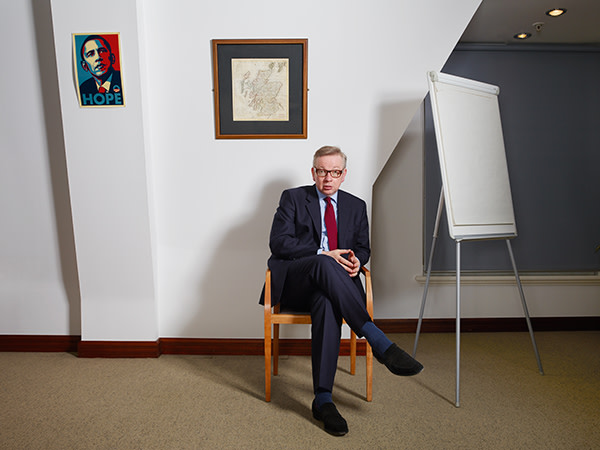
Simply sign up to the Life & Arts myFT Digest -- delivered directly to your inbox.
Under the intense gaze of Lenin and Malcolm X, Michael Gove is setting out his plan to break the grip of a bourgeois elite that has taken hold of Britain, seizing key positions in public life, including those at the heart of government – his government.
“It’s ridiculous,” splutters Gove, Britain’s education secretary, as he reflects on the immaculately connected and expensively educated inner circle of David Cameron, his friend and the country’s Conservative prime minister. Four of this exclusive group went to just one private school: Eton College, Cameron’s alma mater. “It doesn’t make me feel personally uncomfortable, because I like each of the individuals concerned,” he says. “But it’s ridiculous. I don’t know where you can find a similar situation in any other developed economy.”
Gove then draws parallels between Cameron’s team and the cabinet assembled by the supposedly nepotistic Tory prime minister Robert Gascoyne-Cecil. “At the beginning of the 20th century, the Conservative cabinet was called Hotel Cecil. The phrase ‘Bob’s your uncle’ came about. It’s preposterous.”
But this is Britain in the 21st century. And Gove is burning with indignation that money can still buy the education that opens doors to the top jobs in Britain today, while the state school system allows talent to go to waste. “I don’t blame any of the individuals concerned, that would be equally silly,” he says, referring to Cameron and his team. “But it’s a function of the fact that, as we pointed out a couple of years ago, more boys from Eton went to Oxford and Cambridge than boys eligible for free school meals.”
Gove, the adopted son of an Aberdeen fish processor, has a mission to break open Britain’s top jobs to a much wider talent pool. And while Cameron cites as a role model Harold Macmillan, the patrician and Old Etonian Tory leader of the 1960s, the wall of Gove’s office is lined with a very different pantheon of political heroes.
Alongside Theodore Roosevelt, Barack Obama and Margaret Thatcher is the unyielding image of Lenin – whom Gove claims invented the phrase “education, education, education” – and the portraits of Malcolm X and Martin Luther King. “I see education in the UK as a civil rights struggle,” Gove says.
The 46-year-old blinks defiantly from behind his thick-rimmed glasses, hair neatly parted, contorting his imposing frame into increasingly unlikely positions as he shifts sideways in his chair. “I don’t think I’m a revolutionary and I’d certainly be an unlikely one,” he says in his sonorous, clipped Scottish tones. But Gove’s clear-sighted political goals – and a growing sense that he is running out of time to achieve them – make him perhaps Britain’s most intriguing and combustible politician.
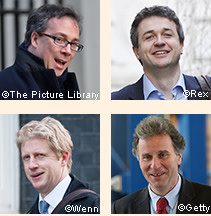
The sight of Gove – a Tory politician with strong neoconservative convictions – working under the watchful eye of Malcolm X is a visual reminder that this is a man of multiple and often contradictory identities. He wants to turn state schools into centres of excellence but is loathed by many teachers; his friends speak of a man who shies away from confrontation, yet he is at the centre of some of the most acrid rows in British politics; and his political persona combines social liberalism with hard-right euroscepticism and Zionism.
But the overriding impression from talking to Gove’s friends is that this is a man ever more frustrated: frustrated at having to work in a coalition government, anxious that time is running out to secure his schools revolution and aware that other political avenues for him appear blocked. And as his frustration mounts, Gove has become increasingly unpredictable, hard to deal with and uncontainable.
“A key change to Michael during the past few years is a consciousness of the sand in the clock running out,” says a friend. Gove agrees, saying that the fear of failing to use his time in office effectively is “powerfully in my mind”. He still remembers the advice given to him over a drink by Steven Joyce, a senior New Zealand government minister dubbed “Mr Fixit”: “It’s always later than you think.” Colleagues can sense the frustration. “He’s become less of a team player,” says one cabinet colleague. “You have seen that transformation over the past six months.”
Gove insists he does not want to be a future Conservative leader and would be terrible at the job – but those who know him best believe the education secretary is not so sure. “I suspect there is a tension between wanting to be taken seriously as a future leader and wondering if he could make a success of it,” says one close colleague.
Married to Sarah Vine, a Daily Mail columnist, and the father of a young daughter, Bea, and a son, Will, Gove has always been a fascinating figure at Westminster. A former BBC and Times journalist with a flair for phrasemaking, he played a central part in Cameron’s drive to “modernise” the Conservative party. He seemed refreshingly untribal, lauding Tony Blair, the former Labour prime minister, as “the master” and praising Blair’s attempt to export liberal democracy to the Middle East.
But his determination to transform England’s state schools – often finding his initiatives blocked by the Tories’ Liberal Democrat coalition partners – has marked him out as an abrasive figure in government. In recent months he admitted getting “heated” in a House of Commons row with the Labour opposition after it failed to back military strikes on Syria; engaged in a vitriolic dispute with Nick Clegg, leader of the Liberal Democrats, over schools policy and lambasted the left (and by implication some ministerial colleagues) for failing to defend the first world war as a “just” conflict required to combat German aggression.
Sir Michael Wilshaw, the head of the schools inspectorate Ofsted, once hailed by Gove as “a hero” for his pioneering work as a headteacher, claimed that the education secretary had let loose the “attack dogs” on him (although he subsequently retracted the comment). Sally Morgan, the Labour peer who chairs Ofsted, has had her tenure terminated, claiming Gove is replacing her for political reasons.
For a politician renowned for his courtesy and apparent aversion to conflict, Gove has been getting into a remarkable number of scrapes. “It’s Dr Gove and Mr Hyde,” says one friend. “He has to work out who he is.”
To see “Dr Gove” in action, a school visit is a good place to start. Bohunt School in Hampshire is the exemplar of what the education secretary wants to achieve: a state school with an outstanding academic record and a remarkable extracurricular range. Gove chats to pupils, discussing a recent school trip to the Himalayas and inspecting a basketball lesson conducted entirely in Mandarin. It looks and feels like an expensive private school; Gove, of course, believes you shouldn’t be able to tell the difference.

Bohunt is an academy, a breed of freestanding schools pioneered by the Blair government and enthusiastically promoted by Gove as a way of breaking what he sees as the dead hand of local council control. They have been accompanied by Gove’s flagship “free schools” set up by local parents and teachers, accountable to the secretary of state, not town halls.
His support for these schools is one of the central contradictions in Gove’s ideology. It is what one colleague describes as the battle of “Stalinism versus Liberalism” in Gove’s political psyche: on the one hand, devolving schooling powers to local people, while at the same time snatching back the initiative by doling out frequent and detailed prescriptions on what exactly teachers should teach and how it should be taught.
At Bohunt, Gove is in his element: courteous, inquiring, sharing banter with pupils about the latest Star Trek movie (he prefers the original). One of the pupils hands Gove an umbrella to shelter him from a torrential downpour as he prepares for his task of the day: opening a new block. “Sorry, thank you, you’re so kind, thank you,” he says.
Teachers complain about Gove’s meddling in the curriculum and his tendency to change things halfway through the year but Ray Morton, chair of Bohunt’s governors, praises Gove’s four-year record at the education department. “He has vision, he has the fire to change things. I think he has done more for education than anyone in that role for the last 20 years.”
Back in his office in Westminster, Gove makes it clear that he wants every school to provide the same kind of opportunity afforded to him by Robert Gordon’s College – an imposing, granite, fee-paying school in Aberdeen – and by his parents, who found the money to send him there.
Gove was born Graham, the son of an unmarried mother in Edinburgh in August 1967, and was adopted at the age of four months by a couple in Aberdeen. A younger daughter, Angela, was adopted five years later and the young Michael grew up watching his father skinning and gutting smoked fish. He says his parents made “sacrifices” to pay for his education. When his father’s business collapsed, it was a “difficult” time but he won a scholarship to complete his schooling.
“Two things in particular have determined the course of my life,” he says. “The first being adopted by my parents and the second the decisions they took about the schools that I went to and the support that they gave me.” He says his life was transformed by teachers; he was born in circumstances, he adds, “where my life could have followed a very, very different track”.
Once in office, Gove set about taking on the educational establishment, which he claimed was responsible for accepting such low standards – the “enemies of promise” or what he memorably labelled “the Blob”, after the amoebic monster in a 1950s horror film.
Gove may claim he is not a revolutionary but his onslaught was uncompromising, implemented by a close-knit team of zealous supporters, who utter phrases such as “purges work”. Another says: “There’s institutional power that needs to be destroyed. A lot of our job is walking along the cliff edge and stamping their fingers off.”
Gove says he only used the term “the Blob” a couple of times – indeed, he mumbles the word apologetically – but it set the battle lines for a four-year war of attrition with many in the teaching profession. Opponents argue that antagonising the very group responsible for delivering a daunting overhaul of exam systems, curriculums and league tables – the 438,000 teachers at England’s state schools – is bad management to say the least.
At the last election a YouGov survey of teachers’ voting intentions found that 33 per cent were Tory and 32 per cent Labour; a new poll reveals that only 16 per cent are now Tory and 57 per cent back Labour. According to Peter Kellner, president of YouGov, the education secretary’s failing has been an inability to progress beyond being a “divisive policy wonk” to the sort of politician who inspires wider confidence.
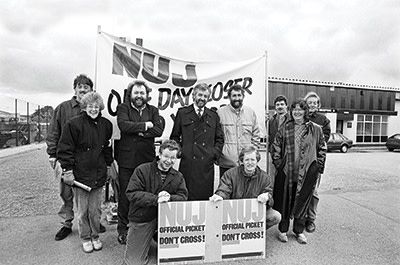
“Rightly or wrongly, I think these people who look at Gove and dislike him don’t see someone who’s on a mission to improve British schooling but someone who’s on a mission to deliver a partisan agenda,” Kellner says. “What he’s failed to do is to convey that he’s doing this for the sake of Britain’s children, rather than for the sake of an ideology.”
First among Gove’s opponents are the teaching unions, who complain about a brutal political operation running a demoralised education department and claim that the secretary of state does not listen to the profession. Mary Bousted, general secretary of the Association of Teachers and Lecturers, says that in meetings Gove goes from being “almost embarrassingly courteous” to a “clever, clever Oxford Union debating style”.
Gove acknowledges the problem with teachers but insists: “I absolutely haven’t set out to burnish a reputation as a macho figure by picking fights.” He regrets not having taken more of the teaching profession with him but says: “I think there is a consensus view that we’ve got the best generation of teachers ever.” And he firmly denies he is “only interested in a 1950s grammar-school education” with an emphasis on academic rigour, ignoring the needs of those who might benefit more from a vocational training.
Gove admits to making mistakes but critics say he would be better off heeding advice earlier on, rather than hitting the brakes as his policy careers towards a brick wall. He says he misjudged the angst that would be caused in local constituencies when he cancelled new school building projects shortly after coming to office, and that he “bit off more than I could chew” with his abortive attempt to completely reinvent Britain’s school exam system. For a former broadcast journalist, raconteur and hilarious mimic, he finds it curiously difficult to communicate his ideas and take people with him: “Obviously Michael is not Reagan,” says one close aide. “Could we have done things better on the communications front? Definitely.”
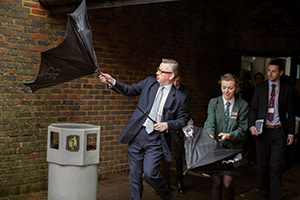
Throughout this upheaval, Gove’s department began to operate almost as a cell within government. He was accused of using a private email account to keep information away from officials and the public. Meanwhile, Gove’s colleagues say he dislikes working with ministers in other departments and that he enjoys huge autonomy from Downing Street. One Tory colleague says: “They’ve been happy that Number 10 doesn’t care about schools and doesn’t pay any attention. It means they’ve been left to get on with it.”
…
Gove’s critics pinned the blame for the abrasive style on Dominic Cummings, the minister’s former adviser, who was often accused of vicious briefings against perceived enemies. Gove and his team have never disclosed who operates the @toryeducation Twitter feed, which has made brutal personal attacks on those who criticise the secretary of state or his policies. In the past, this included branding the Financial Times’ former education correspondent, Chris Cook, a “Walter Mitty” figure, and calling him a “stalker” after he revealed the use of private email. But Gove says: “Politicians who have pursued an agenda are always being accused of having colleagues or outriders who ruffle too many feathers.” He says he takes full responsibility.
Gove’s management style is one of the many apparent contradictions in his personality. In spite of being seen as the government’s most confrontational minister, he does not seem to relish a fight. As home news editor of The Times – the journalistic equivalent of a sergeant major – Gove would call reporters half an hour after deadline to inquire tangentially where their copy was. Instead of issuing a dressing down, Gove would say, “Should you wish to file [send your copy], that would be lovely – but I just wanted to see how you were feeling.”
In departmental meetings, Gove will invite different views and agree with them all. “It’s only later on that you discover he doesn’t agree with you at all,” says one colleague. Another says: “He very, very rarely raises his voice. People sometimes say they wished he would let his displeasure be known. That’s how the system works.”
Staff close to him often describe the minister as loyal, kind and thoughtful, although Tim Loughton, a former Tory children’s minister, says Gove rarely deigns to speak to many officials in further-flung parts of the department, claiming his remote style is “terribly anachronistic, terribly bureaucratic, terribly formal”. In those outposts, staff are said by one insider to regard Gove with a mixture of “respect, admiration and fear”.
Gove himself seems genuinely surprised by the upset and angst he has caused in the education world – and by his ability to withstand it. “I’m less confrontation-averse and thin-skinned than I might have thought,” he says.
One minister says: “I think the genuine Michael is instinctively courteous. But when it comes to putting the knife in, he can be as rude as the most extreme politician at Westminster. It’s unusual to find that in one person.”
Gove’s political identity is equally complex. After Oxford university, where he was elected president of the Union, he was rejected for a job at the Conservative Research Department because he was “insufficiently Conservative”. Instead he went off to forge a career in journalism, joining the Aberdeen Press and Journal, before heading to London to work for the BBC and later The Times.
Gove says he never had any doubts about whether he was a Tory. His patriotism, euroscepticism, neocon passion for spreading liberal democracy – by force of arms if necessary – and his strong stance against Islamic extremism, expressed in his book Celsius 7/7, are an easy fit. However his socially liberal views on issues such as gay marriage, race and social mobility only truly found a home when his friend David Cameron became the party leader in 2005.
It was Cameron, a newly elected MP, who persuaded Gove to stand for parliament over lunch at his house (Gove still lives in the North Kensington area once inhabited by the prime minister and other members of the Tory “Notting Hill” set of modernisers). Gove at the time was an opinion writer, sitting on the political sidelines “throwing bog roll”.
“I was saying: ‘All the Tories are talking about is fox-hunting and this and that. This is absurd.’ And David said: ‘If you think that, why don’t you get on the pitch?’” There was a further factor. Having become a father of two, Gove says he found himself wondering: “When my children asked me later in life what was I proud of, was I going to say I wrote a fantastic leader on the Lisbon treaty?” Instead he wanted to show his children and his parents: “I have actually achieved something.”
He attributes his “proud Zionism” in part to the time he spent with his mother attending services and Sunday school at the Church of Scotland. He says there was a strong identification between Scotland and Israel, and that the Scottish Presbyterian tradition saw the Scots as having “a direct relationship with God”. The Church of Scotland, to this day, maintains a hotel on the shores of the Sea of Galilee and Gove says: “I remember the story of the Jewish people, as told to me, through Bible stories at Sunday school. It certainly gave you a predisposition to be sympathetic.”
Some Tories seem to believe Gove’s Zionism is down to the fact he may have found some Jewish blood in the family line but that is not the case: he has never traced his genealogy out of respect for the feelings of his adoptive parents.
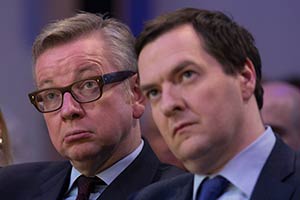
Although George Osborne, the chancellor of the exchequer, likes to boast of his links with neocons in Washington, he concedes that Gove makes him look like a moderate on foreign policy issues. Gove was a leading voice for intervention in Libya and was incandescent with Labour – accusing the party of “appeasing Assad” – during last year’s debate on whether to bomb Syria.
The education secretary’s friends think these rightwing postures provide him with some political space to pursue his more liberal causes. However Decca Aitkenhead, in her Guardian profile of Gove in 2012, trawled through Times articles published under his name and found little evidence to support the idea that he is the “arch-moderniser” in policy terms. But he has been a passionate supporter of childcare reform and his backing of same-sex marriage puts him at odds with much of the Tory party. What is certain is that Gove, like Cameron, recognises that the Tories needed to sound like they live in modern Britain.
Gove’s hardline positions can make him an awkward cabinet colleague. One friend of Gove’s – referring to his relationship with Cameron – says: “I think that people underestimate how close Michael and David are personally and they overestimate how influential Michael is politically. He’s much less influential in Number 10 than people think.”
William Hague, foreign secretary, tries to keep Gove at arm’s length, fearing his interventionist bombast and staunch euroscepticism is not conducive to the conduct of good diplomacy. Meanwhile Theresa May, home secretary, has scratchy relations with Gove after a cabinet bust-up last year.
“Michael thought Theresa was trying to undermine Cameron with a speech she’d made after the local elections,” says one Tory cabinet minister. “He said in front of everyone that we all had an obligation to stand behind the prime minister and he said he was particularly referring to Theresa May.”
Gove’s career path has in some ways been blocked by his own political views. He could not be sent to the Foreign Office lest he provoked a war or pulled Britain out of the EU, while his friends say he would be driven mad at the Home Office by the constraints of EU law and the European Convention on Human Rights when dealing with Islamic extremists. As for the Treasury, Gove has never been animated by economics.
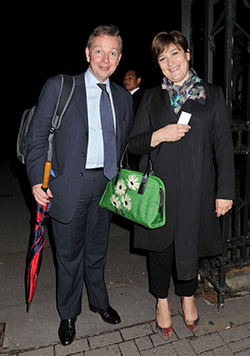
Some talk of him becoming party chairman but while his appointment might rally Tory activists, the polls suggest Gove is hardly the man to win over floating voters ahead of the May 2015 election. As he ruefully admits, the Lib Dems continually attack him because their pollsters say it is popular.
But that has not stopped him intervening across a range of policy areas, often to the irritation of colleagues. “I think I was always over-opinionated and mouthy about issues outside my brief right from the beginning – I think it’s a hangover from journalism,” he says.
…
So what would he like to do next? Gove repeats the standard formula that he would like to stay in his current job but then adds the rider that he would like to expand his empire: “What I’d really like to do is this job, plus universities. I think that universities and science should be in this department.” Currently they sit in the business department.
Some friends say they would not be surprised if Gove’s future lies in a return to journalism. He occasionally re-enters the fray with his trademark columns, taking on weighty themes leavened with a populist touch. His first world war piece for the Daily Mail was typical, leading with an attack on the treatment of the war by the BBC comedy Blackadder.
But he has also maintained close relations with Rupert Murdoch, proprietor of The Times, whom he hailed during evidence to the Leveson inquiry into phone hacking as “one of the most impressive and significant figures of the last 50 years”. Gove, in turn, is described by one News UK insider as “not family, but favoured son” in the Murdoch stable. It is clear that a return to newspapers would be an entirely natural way for the education secretary to retreat from politics, morphing from Mr Hyde back to man of letters Dr Gove. One colleague says: “I can see him being a future editor of The Times.”
While Gove’s courting of the Mail and The Times might represent sensible forward-planning for life beyond politics, some have seen it rather as putting in place vital support for the next stage of his political career – a possible future bid for the Tory leadership.
For now, Gove is committed to trying to secure Cameron’s modernising Tory legacy by promoting the succession of his friend, George Osborne, when Cameron steps down. “He will go over a cliff edge with him,” says one close ally. Two scenarios are widely discussed among Tory MPs: that Cameron would certainly quit after a 2015 election defeat or that he steps down in the next parliament after his 2017 EU referendum.
“He’s a friend and I think he’s brilliant,” Gove says of Osborne. “I think he’s still consistently underrated.” Gove also praises the qualities of Boris Johnson, the London mayor. “I met Boris when I was a first-year student at university,” he says. “He does have a very highly developed sense of humour but he also has a very coherent world view. He’s a particular type of liberal Tory.” The two men regularly meet and enjoy each other’s company.
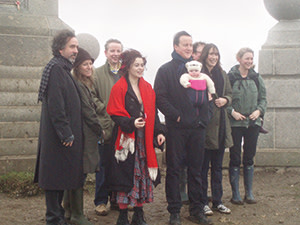
But the education secretary is less glowing about Boris in private, telling Murdoch over dinner that Johnson was not up to the job as prime minister. “He has serious doubts about Boris’s administrative capabilities,” says a friend. Johnson got to hear about the Murdoch dinner and was furious.
But what about Gove himself? The education secretary is ranked third favourite by the bookies to become the next Tory leader (behind Johnson and Theresa May), but he is adamant that he neither wants the job, nor would he be any good at it.
“I don’t have what it takes,” he says. “I have seen David close up on a variety of occasions: he just has an equanimity and a stamina, a sense of calm, good judgment.” He adds: “The pressure of the job is phenomenal and it takes a toll on you and your family and I don’t think I could do that.”
Gove’s friends say he is determined to protect his family, which makes it somewhat surprising that his wife frequently draws attention to their family life in her column; this month, for example, Vine confirmed that their daughter was to attend a state secondary school. She said this was the first time a Tory education secretary had made such a choice – and accused parents who paid for a private education of “snobbery”.
“Of course the parents of private schoolchildren are paying for the best teachers and facilities,” she wrote. “But let’s be honest: they’re also paying for their child to mix with the right kind of kids.” Her columns have also revealed that her husband finds German chancellor Angela Merkel “as hot as Jennifer Lopez”, that he once returned from a holiday in Austria with a pair of swimming trunks “in the style of Lederhosen” and has taken up the ukulele in homage to the Gove family’s favourite band, Mumford & Sons.
Further disclosures include that Gove read more than 1,000 pages of Robert Caro’s biography of Lyndon B Johnson in the delivery room while waiting for her to give birth, and that more recently he had embarked on a diet aimed at “dropping two dress sizes in six weeks” – perhaps to counteract his documented fondness for Doritos, Coca-Cola, Dairylea Dunkers, “luxury coleslaw” and custard creams.
But what if it became clear that Osborne could not win the leadership and that he – Gove, the adopted son of an Aberdeen fishmonger – was the best-placed candidate to stop the transfer of the Tory leadership to Johnson, another Old Etonian?
“You’ve got to have that extra spark of charisma and star quality,” he insists. “David has it, George has it and Boris has it. And I don’t think I do. It’s like if you’re an actor: some people are going to be the leading man like George Clooney and there are others destined to be the leading man’s best friend. Other people can be Sherlock Holmes – I’m very lucky if I can be Dr Watson.”
Gove’s friends say he means every word he says and that he acknowledges he is not very popular. But, says one: “Somewhere deep inside him there must be an unquenchable flame and a question in his own mind of whether he could actually do it.” To become the party leader would be the ultimate expression of Gove’s view that good education can allow “every child to be the author of their own life story”.
And whatever he says about the Tory leadership, Gove acknowledges that there is a deep force within him that drives him on. “Someone has said to me that children who are adopted often feel the need to prove to their parents that their parents made a wise decision in taking them on. So children who are adopted feel a greater need to demonstrate – whether by chalking up money, achievements or affection for their parents – that their parents didn’t invest all this time and care as a matter of choice, for nothing.”
——————————————-
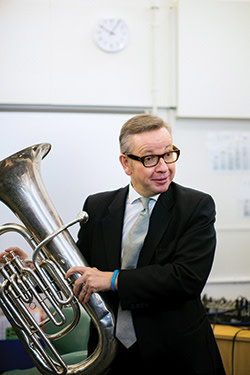
Michael Gove: the CV
1967 Born in Edinburgh
1985-1988 Studies English at Lady Margaret Hall, Oxford
1996 Joins The Times as a leader writer
2005 Member of Parliament for Surrey Heath
2007 Shadow secretary of state for children, schools & families
2010 Secretary of state for education
2011 Criticises schools for not studying pre-20th-century classics
2012 Primary school reforms denounced as “fatally flawed” by leading government adviser
2013 Forced to abandon plans to replace GCSEs with English Baccalaureate after senior educationalists warn it is “too much, too quickly”
2014 Becomes the first Conservative education secretary to send a child to a state secondary school
George Parker is the FT’s political editor; Helen Warrell is the public policy correspondent.
To comment on this article please post below, or email magazineletters@ft.com
Comments